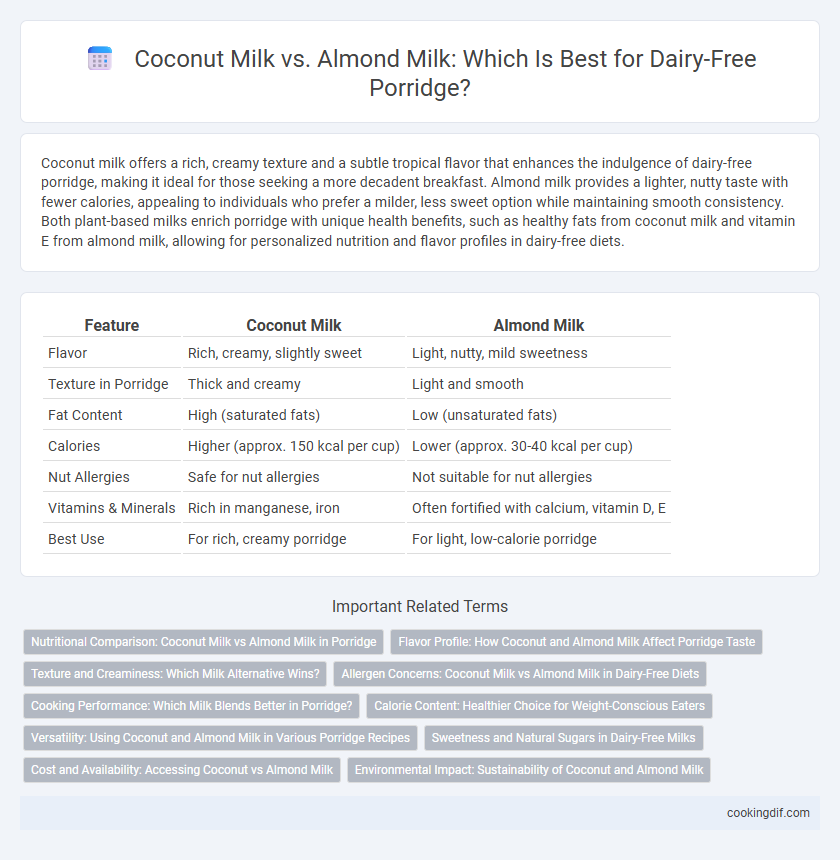Coconut milk offers a rich, creamy texture and a subtle tropical flavor that enhances the indulgence of dairy-free porridge, making it ideal for those seeking a more decadent breakfast. Almond milk provides a lighter, nutty taste with fewer calories, appealing to individuals who prefer a milder, less sweet option while maintaining smooth consistency. Both plant-based milks enrich porridge with unique health benefits, such as healthy fats from coconut milk and vitamin E from almond milk, allowing for personalized nutrition and flavor profiles in dairy-free diets.
Table of Comparison
| Feature | Coconut Milk | Almond Milk |
|---|---|---|
| Flavor | Rich, creamy, slightly sweet | Light, nutty, mild sweetness |
| Texture in Porridge | Thick and creamy | Light and smooth |
| Fat Content | High (saturated fats) | Low (unsaturated fats) |
| Calories | Higher (approx. 150 kcal per cup) | Lower (approx. 30-40 kcal per cup) |
| Nut Allergies | Safe for nut allergies | Not suitable for nut allergies |
| Vitamins & Minerals | Rich in manganese, iron | Often fortified with calcium, vitamin D, E |
| Best Use | For rich, creamy porridge | For light, low-calorie porridge |
Nutritional Comparison: Coconut Milk vs Almond Milk in Porridge
Coconut milk provides higher saturated fats and calories, contributing to a creamy texture and richer taste in dairy-free porridge, while almond milk offers fewer calories, lower fat content, and a mild nutty flavor. Almond milk contains more vitamin E and calcium when fortified, supporting antioxidant benefits and bone health, whereas coconut milk is naturally rich in manganese and lauric acid. Choosing between coconut milk and almond milk for porridge depends on dietary preferences, caloric needs, and desired nutrient profiles.
Flavor Profile: How Coconut and Almond Milk Affect Porridge Taste
Coconut milk imparts a rich, creamy texture with a subtle tropical sweetness that enhances the natural warmth of porridge, creating a velvety mouthfeel. Almond milk offers a milder, nutty flavor that adds a light, slightly earthy note without overpowering the porridge's base taste. Choosing between coconut and almond milk depends on whether you prefer a bold, luscious profile or a delicate, subtle nuttiness in your dairy-free porridge.
Texture and Creaminess: Which Milk Alternative Wins?
Coconut milk delivers a rich, creamy texture that enhances porridge with a velvety mouthfeel, making it a top choice for those seeking indulgence without dairy. Almond milk offers a lighter, slightly nutty consistency that results in a thinner, less creamy porridge, appealing to individuals preferring subtle flavors and lower fat content. For a luxuriously creamy porridge, coconut milk outshines almond milk in texture and creaminess.
Allergen Concerns: Coconut Milk vs Almond Milk in Dairy-Free Diets
Coconut milk and almond milk are popular dairy-free options for porridge, but their allergen profiles differ significantly. Coconut milk is generally safe for those with nut allergies since coconuts are classified as fruits, whereas almond milk poses a risk for individuals with tree nut allergies. Choosing coconut milk reduces allergen concerns for sensitive diets, making it a safer alternative in dairy-free porridge recipes.
Cooking Performance: Which Milk Blends Better in Porridge?
Coconut milk creates a creamier and richer texture in porridge due to its higher fat content, enhancing the overall mouthfeel and flavor absorption. Almond milk blends more smoothly without overpowering the porridge's natural taste, offering a lighter and subtly nutty finish. For cooking performance, coconut milk provides a thicker consistency, while almond milk ensures a less dense, more balanced porridge.
Calorie Content: Healthier Choice for Weight-Conscious Eaters
Coconut milk contains approximately 150-230 calories per cup, making it richer and more calorie-dense compared to almond milk, which has about 30-60 calories per cup. For weight-conscious eaters seeking a lower-calorie option in their dairy-free porridge, almond milk offers a lighter alternative without sacrificing creaminess. Its lower calorie content supports calorie control while maintaining a smooth texture essential for a satisfying porridge experience.
Versatility: Using Coconut and Almond Milk in Various Porridge Recipes
Coconut milk offers a rich, creamy texture that enhances tropical and spiced porridge recipes, making it ideal for dishes with flavors like cinnamon, cardamom, or mango. Almond milk provides a lighter, subtly nutty taste that complements fruit-based or vanilla-infused porridges, maintaining a delicate balance without overpowering other ingredients. Both milk alternatives serve diverse culinary purposes, adapting to a wide range of dairy-free porridge varieties from creamy to lightly textured options.
Sweetness and Natural Sugars in Dairy-Free Milks
Coconut milk contains higher natural sugar levels than almond milk, contributing to a sweeter taste that enhances the flavor of dairy-free porridge. Almond milk offers a milder sweetness with fewer natural sugars, making it ideal for those seeking a less sugary option. Choosing between these milks depends on desired sweetness and dietary preferences for sugar intake in porridge recipes.
Cost and Availability: Accessing Coconut vs Almond Milk
Coconut milk is generally more affordable and widely available in most grocery stores compared to almond milk, making it a cost-effective choice for dairy-free porridge. Almond milk tends to be pricier due to higher production costs and may be less accessible in some regions. Consumers seeking budget-friendly and easily sourced dairy-free milk options often prefer coconut milk for their porridge recipes.
Environmental Impact: Sustainability of Coconut and Almond Milk
Coconut milk has a lower water footprint compared to almond milk, requiring significantly less water to produce, making it a more sustainable choice in regions with water scarcity. Almond milk production demands extensive irrigation, particularly in drought-prone areas like California, raising concerns about its environmental impact on water resources. Both plant-based milks reduce greenhouse gas emissions compared to dairy milk, but coconut milk's resilience in diverse tropical climates contributes to a smaller overall environmental footprint.
Coconut milk vs Almond milk for dairy-free porridge Infographic

 cookingdif.com
cookingdif.com